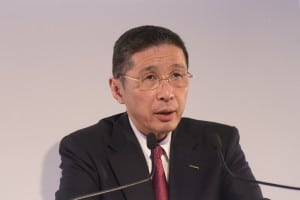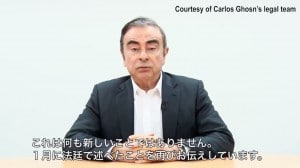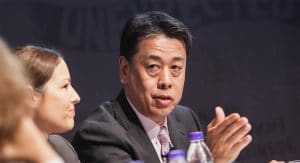Nissan Motor Co.’s new CEO will be facing some tough challenges when he takes over at the beginning of the year, Makota Uchida not only declining sales and earnings but the mess triggered by the arrest of former chairman Carlos Ghosn last November.
The 53-year-old Uchida was named earlier this month to succeed Hiroto Saikawa who stepped down after he found himself caught up in the company’s ongoing executive pay scandal. In a video message to Nissan employees, Uchida, who has been serving as the automaker’s head of Chinese operations, said his primary mission is to “restore business performance and regain trust in Nissan.”
Though Uchida declared that “Nissan is on the right path to recovery,” he acknowledged that “it might be a gradual process.”
(These Nissan, Infiniti models won’t be back for the 2020 model-year.)
The past year has clearly been a tough one for the second-largest Japanese automaker. Its sales have taken a sharp downturn, earnings for the fiscal year ending March 31 tumbling 57%, to 319.1 billion yen, or $2.9 billion. In turn, that trigger plans to eliminate 12,500 jobs worldwide, while Nissan also will cut production capacity by 10%, eliminating about 10% of its model line-up, over the next three years.

Nissan CEO Hiroto Saikawa was caught up in the internal corruption scandal that initially targeted former Chairman Carlos Ghosn.
But nothing has done more to hammer the carmaker’s reputation like the scandal that began unfolding with the arrest of Ghosn, the man who led the $6 billion bailout of the company back in 1999. The Brazilian-born executive was initially accused of concealing millions of dollars of income but has since been hit with a series of additional charges, including claims of improperly diverting company funds.
Yet, questions continue to surround the case, something Ghosn has claimed was nothing more than a coup, pointing to the role of his one-time protégé, Saikawa. That Nissan veteran was ultimately forced out when it was revealed that he, too, had received excessive and inappropriate pay.
After a months-long search, Nissan’s beleaguered board announced not only Uchida’s appointment but also appointed Ashwani Gupta as chief operating officer, with Jun Seki rising to become chief operating officer.

Former Nissan Chairman Carlos Ghosn issued a video in April in which he accused Nissan officials of staging a coup against him.
There was a sense of relief when Saikawa tendered his resignation, numerous sources have told TheDetroitBureau.com. But the new management team will have to deal with an internal culture that has become “toxic,” according to one source. He pointed to the ongoing investigation that Saikawa said would further look into corruption, but which others privately claimed was aimed at solidifying control for the executive and his backers. Either way, it led to numerous departures, especially amongst foreign managers like Jose Munoz who had served as Nissan’s chief performance officer until last winter.
One of the biggest concerns for those both in and outside Nissan is the damage that has been done to the automaker’s two-decade-long relationship with Renault, the French automaker that saved it from potential bankruptcy and appointed Ghosn to head the rescue effort.
(Nissan recalls 1.2 million vehicles. Click Here for more details.)
Insiders have said that joint programs have been delayed or slowed and there had been questions, under Saikawa, as to whether the two companies – and third partner Mitsubishi – could salvage an alliance that collectively transformed them into one of the world’s top-selling automotive groups.
The bad blood became particularly apparent in June, when Nissan effectively scuttled a proposed merger between Renault and Fiat Chrysler Automobiles.

One of Uchida’s biggest challenges will be addressing the internal chaos that emerged over the past year, particularly at Nissan HQ in Yokohama.
In his comments to Nissan employees, Uchida appeared to be signaling a desire to mend fences, saying his goals “will include the building of alliance partnerships.”
It is unclear, at this point, if he will continue his predecessor’s push to have Renault reduce both its 43.4% stake in Nissan and its ability to control key executive and board appointments.
A key attribute of Uchida, sources said, is his ability to view things from a more global perspective than traditional Japanese executives like Saikawa. The Reuter’s new service quoted one insider describing the incoming chief executive as a “foreigner with a Japanese face.”
For his part, Nissan’s new boss reached out to workers for help putting the company back on track.
“Please understand that I cannot do it alone,” Uchida said. “The most important thing right now is to have trust and full contribution from each one of you.”
(Nissan hopes to minimize impact of Brexit. Click Here to learn how.)

